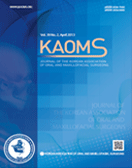Journal of the Korean Association of Oral and Maxillofacial Surgeons
- P-ISSN2234-7550
- E-ISSN2234-5930
- SCOPUS, KCI, ESCI
 ISSN : 2234-7550
ISSN : 2234-7550
악관절환자에서 Synovial fluid에 대한 단백질체 분석에 관한 연구
The analysis of synovial fluid by proteomics from TMD
김태우 (서울대학교)
김상균 (한림대학교)
박태일 (한림대학교)
박준우 (한림대학교)
윤필영 (분당서울대병원)
김영균 (서울대학교)
채창훈 (나노큐어텍)
Abstract
Temporomandibular joint disorder (TMD) can induce severe pain but, its pathogenic mechanisms remain poorly understood. In this study, we analyzed proteomes of human synovial fluid in the superior joint space in the patients with TMD, which is obtained during the treatment arthrocentesis. We’ve got this result that one of the spots was consistently down-regulated in synovial fluid of patients with TMD from analysis of protein pattern. Its molecular weight was estimated to be 33 kDa. Synoviolin was identified in our proteomics analysis of LC/MS/MS. This protein was recently reported as one of the proteins that might affect rheumatoid arthritis (RA). Synoviolin that might be associated with RA was detected in synovial fluid of patients with TMD. We can conclude that synoviolin might be involved not only in the pathogenesis of RA but also in TMD. In result, synoviolin might be involved in the pathogenesis of TMD and can be candidates as new therapeutic targets of TMD or early detection biomarkers.
- keywords
- Temporomandibular joint disorder (TMD), Proteomics, Synoviolin
- 다운로드 수
- 조회수
- 0KCI 피인용수
- 0WOS 피인용수